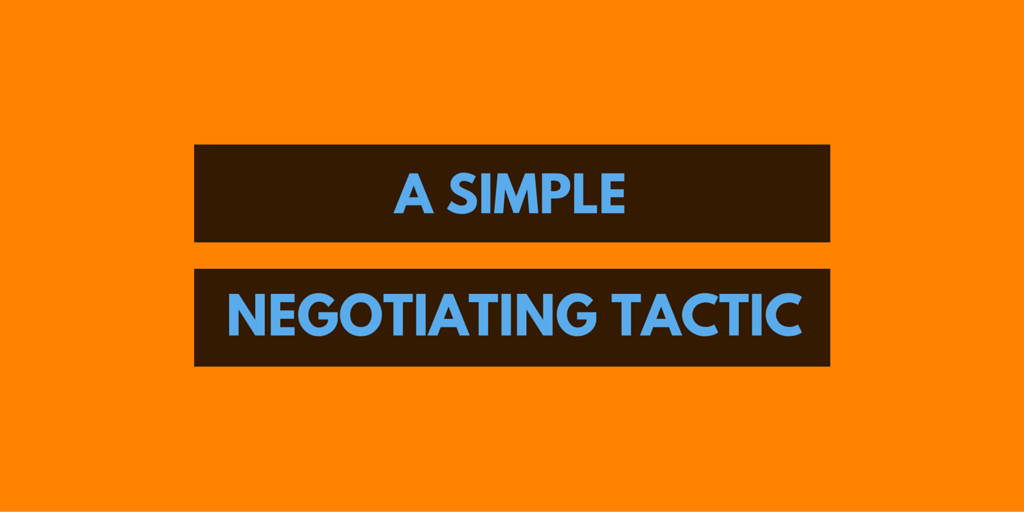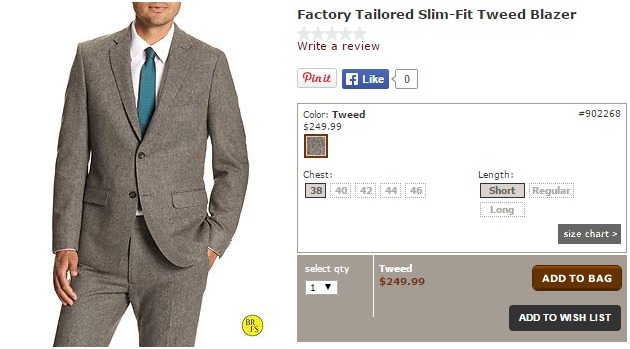
In the world of PPC advertising, negotiation is commonplace.
When you’re on the agency side, you have to negotiate rates with clients, and if you’re on the client side, you have to negotiate the best rate for your business.
Negotiating is also something we do on a daily basis to save or make more money.
Maybe you’re hiring a house cleaner and need to negotiate a better rate. Or maybe you’re selling a door on Craigslist and need to counter a low ball offer.
Whatever the case, negotiation is a useful skill for anyone, especially business owners and managers, to pick up.
That’s why in this post I’m going to share a simple negotiating tactic that will help you save (and make) more money.
The Backstory

Several months ago I was at a Banana Republic store and tried on a sport coat that I liked. It fit well, but there was one problem—the liner in one of the sleeves was torn.
Always looking to get a deal, I thought to myself, “This coat is already on sale, and since I don’t mind putting up with this tear or getting it fixed, I wonder if I can get it for even less than the sale price.”
To test my hypothesis, I went up to the checkout counter and said, “Hey, I’m interested in this jacket, but there’s a tear in the sleeve liner. Can you guys give a discount to make up for that?”
The guy at the checkout counter responded, “We can give you 10% off, but you won’t be able to return it.”
**This next part is the most important, so make sure you pay attention.**
“Oh, I see,” I responded. “I did want to have the option of being able to return it in case I decided I didn’t like it. But, since I won’t be able to and since I’ll need to pay someone to fix the sleeve, could you possibly knock a little more off the price?”
“Let me check.”
The employee walked to the end of the counter and explained my situation to the manager. Without hesitation, the manager said, “Sure, we can give him 25% off,” and then walked over to apply the additional discount.
After the transaction was completed, I walked away with a $200 sports coat with a tear you couldn’t see for $75.
So what can you learn from this?
The Power of Providing a Reason
The most important part of this story comes from the lines with the word “since” underlined. Here’s why.
Instead of just asking for a discount without providing a reason, I mentioned specific reasons why I deserved a discount. They were both specific and logical.
This is much more powerful than simply asking for a discount and not being able to provide a reason.
It also goes along with a very famous study that gets mentioned a lot in marketing circles where psychologist Ellen Langer conducted a study where people asked whether or not they could cut in line to make copies at a printer.
One group said, “Excuse me, I have five pages, may I use the Xerox machine,” and had a 60% success rate when it came to cutting in line without providing any type of reason.
The next group said, “Excuse me, I have five pages. May I use the Xerox machine because I’m in a rush?” The success rate from this group jumped to 94%, all from providing a reason why they needed to cut in line.
The third group, however, was the most surprising. The third group said, “Excuse me, I have five pages. May I use the Xerox machine because I have to make some copies?” Shockingly, the success rate was 93%, nearly identical to when the second group gave a legitimate reason as to why they might need to cut in line.
People now use this study to explain why “because” is such an important word when it comes to persuasion and marketing, and in case you didn’t notice, I used the word “since,” which is a very close cousin to “because,” when negotiating to buy the jacket.
How to Apply This Lesson
The next time you’re negotiating for something, whether it’s a discount on a new car, a better PPC management rate, or a Craigslist deal, be sure to provide reasons why you should get a discount or why you’re unable to provide one.
Another quick example would be purchasing a T.V. stand from someone off of Craigslist that’s being advertised for $100. When you show up to look at it, you find out that it was repainted and the paint job isn’t that great.
To get a discount, first mention that you thought the paint was going to be in better condition while surveying the item in front of the owner. Then, when you’re ready to make an offer, you could say something like, “I like it but was expecting the paint to be in better condition. Will you take $50 since I’m going to have to repaint it?”
Even if the answer isn’t an immediate “yes,” you increase your chances of getting a discount by providing a reason and using the word “because” or “since” than if you just ask for a discount without providing any type of reason.
I’ll let you in on one other secret. Most Americans are not that good at negotiating. This means that if you pick up this tactic and a few other basic negotiating tactics, you’ll be well on your way to saving (and making) more money.
The Author
 Joe Putnam (@josephputnam) is the Director of Marketing at iSpionage, the only competitive intelligence tool that captures the entire PPC conversion funnel—from keywords to ad copy to landing pages. Click here to learn how iSpionage gives search marketing teams a competitive advantage.
Joe Putnam (@josephputnam) is the Director of Marketing at iSpionage, the only competitive intelligence tool that captures the entire PPC conversion funnel—from keywords to ad copy to landing pages. Click here to learn how iSpionage gives search marketing teams a competitive advantage.







